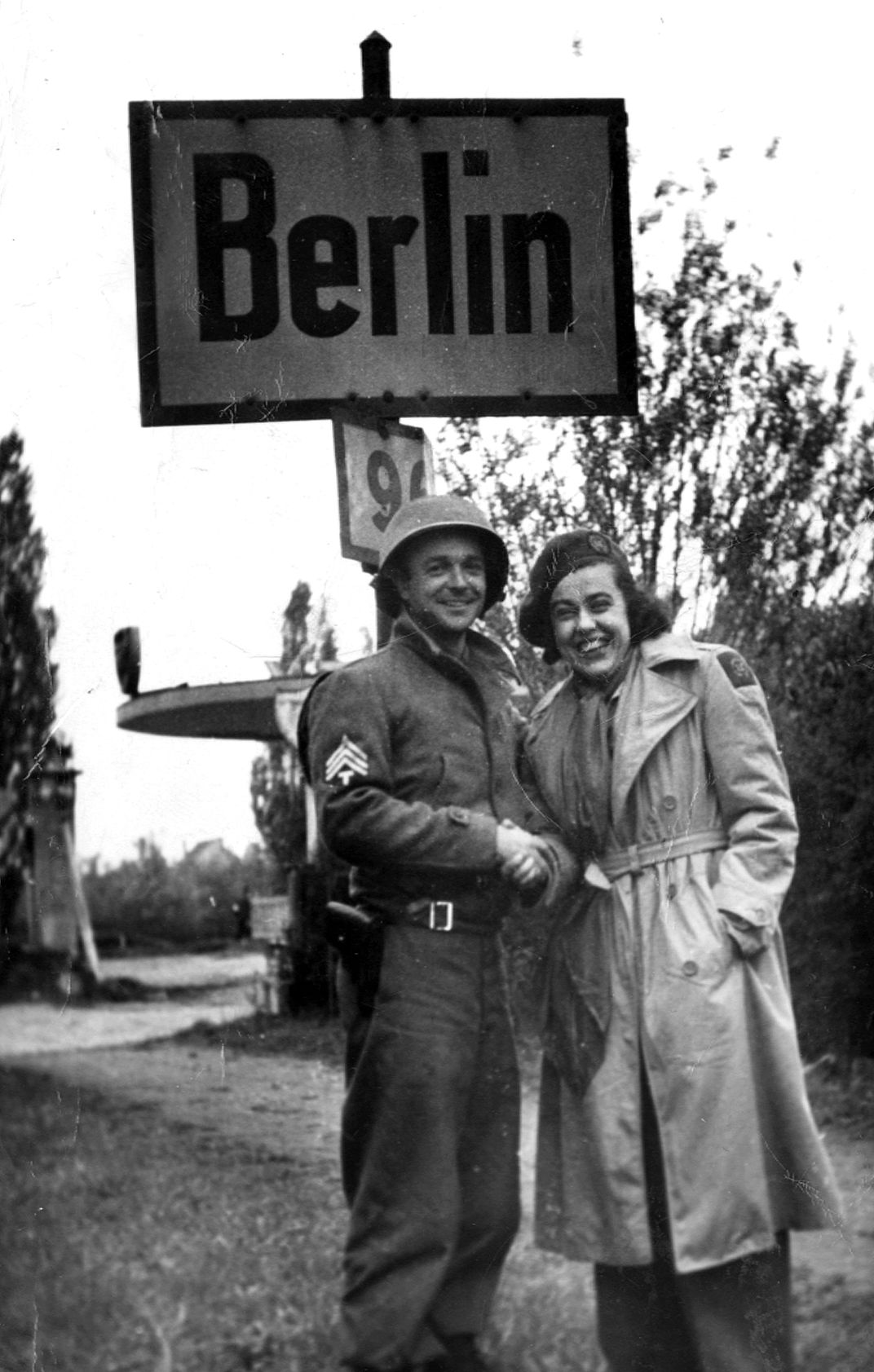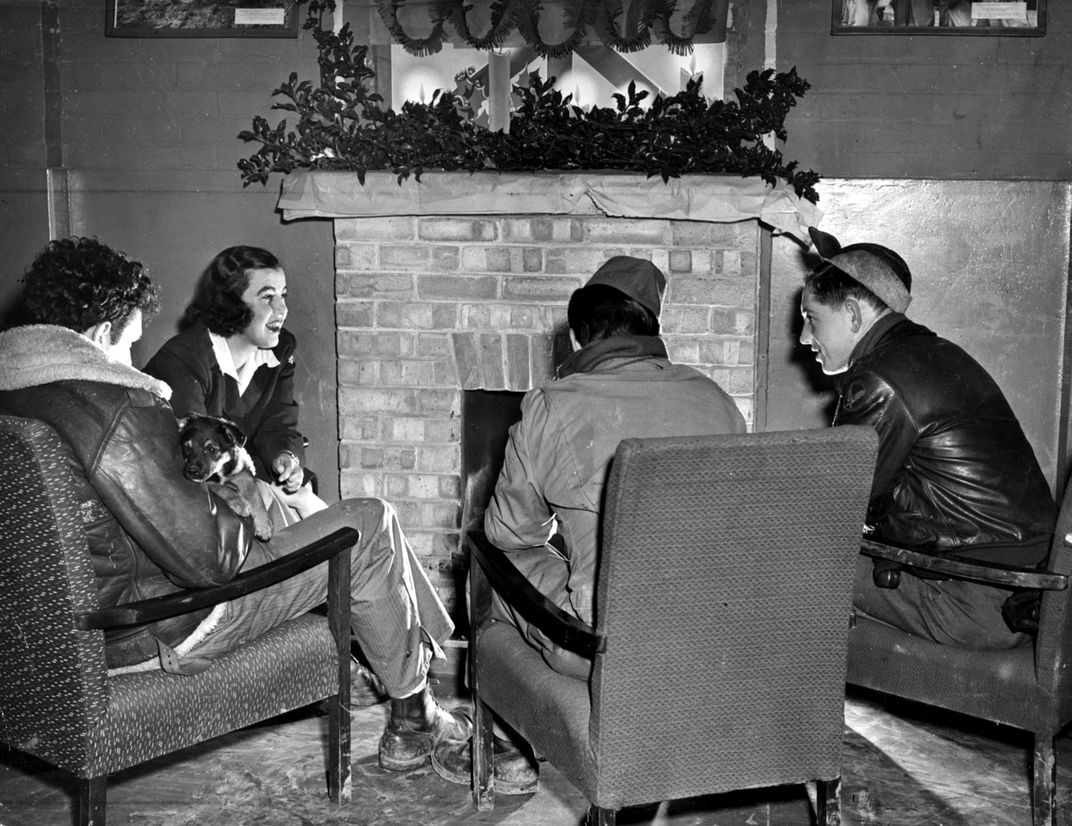Journalist Virginia Irwin Broke Barriers When She Reported From Berlin at the End of WWII
Her exclusive dispatches from the last days of Nazi Germany appeared in newspapers around the country, briefly making her a national celebrity
/https://tf-cmsv2-smithsonianmag-media.s3.amazonaws.com/filer/60/17/6017b130-a73c-4079-9efd-72a7f255c6f5/polaris06144711.jpg)
On April 27, 1945, days before Adolf Hitler committed suicide in his Berlin bunker, an enterprising writer convinced a young Army sergeant to commandeer a jeep and drive into the heart of the embattled city, without an adequate map or any real plan for what might come next.
Virginia Irwin, a reporter for the St. Louis Post-Dispatch, would be one of the first Americans to witness Russian fighters clashing with the remnants of Nazi forces. Irwin’s nerve-wracking journey netted her the scoop of her bold wartime career, but she has since been largely overlooked among pioneering female combat correspondents. No American correspondent had been inside the city in years – foreign reporters had been kicked out in 1941. Irwin provided an unparalleled firsthand account to readers across the nation.
As they wound their way through lines of haggard Russian troops headed for Berlin, a surreal scene awaited Irwin and her traveling companions, journalist Andrew Tully of the Boston Traveler and the driver, Sergeant Johnny Wilson. They saw exhausted soldiers singing and celebrating as they advanced into the final battle. Despite the chaos – bodies littered the sidewalks amid ongoing fighting – the mood encompassed both merciless vengeance and jubilant relief. “The Russians were happy – with an almost indescribably wild joy,” she recalled. “They were in Berlin. In this German capital lies their true revenge for Leningrad and Stalingrad, for Sevastopol and Moscow.”
The arrival of Russian forces in Berlin signaled the proverbial nail in the coffin for Hitler’s regime as Allied forces progressed irreversibly toward the German capital. The specter of the Russians’ arrival inspired fear in residents who had hunkered down to ride out the final, futile months. When Irwin arrived, the city was still under a barrage of artillery and the site of street-by-street combat. She and her companions had no protection whatsoever for their opportunistic push into Berlin, risking safety in their quest for the first reporting out of the Hitler’s Berlin.
That night, navigating into the city without proper maps and no fixed destination, they stumbled across a Russian command post where they were welcomed by a surprised but raucously hospitable group of Russian officers. Irwin’s descriptions were of a dreamlike blend of death and dancing – they were fêted by their hosts as fighting raged blocks away, shaking the ground and filling the air with the smell of “cordite and the dead.” She danced until she was “puffing from the exertion.” Toasts were raised to Stalin, Churchill, Roosevelt and Truman.
She felt a degree of disdain for the German civilians she encountered, but was so taken by her Soviet hosts – who “fight like mad and play with a sort of barbaric abandon” – that in the emotion and gravity of the moment she declared a desire to “join the Russian Army and try to help take Berlin.”

Irwin typed this account by candlelight as it happened, but it wasn’t until more than a week later, after V-E Day was declared, that readers across the country would be captivated by this glimpse into the last chapter in the long and bloody fight for Europe. There had been a steady stream of stories about hometown soldiers fighting in Europe, but Irwin’s series showed readers war from another perspective. For the Russians she encountered, this was not a distant war – it was one in which they had lost loved ones at home. The sense of vengeance deeply felt, and the corresponding fear among Germans remaining in Berlin, was palpable. “You get a real sense of a city on the brink with everything falling apart from the way she writes about it - you get a sense of what she felt,” says Jenny Cousins, who spearheaded an archival project at the American Air Museum in Britain that included Irwin. “It’s a very visceral account, and obviously that’s the first. People haven’t been in Berlin in years other than POWs. There’s no one else who’s got this experience. She was there before Hitler’s death.”
The Associated Press wire service realized the magnitude of her scoop, and soon picked up her story, with newspapers from around the country running the series in full. An editor from The Seattle Times sent the Post-Dispatch a congratulatory note, calling her “journalistic glory undimmed by the shabby treatment accorded by the Army censors.” Even in its belated form, it impressed everyday readers and journalism professionals alike.
Irwin was born in 1908 in Quincy, Illinois, where her father worked as a salesman. The oldest of three children, she was close to her family but as a young adult would experience two tragedies in close succession. Her father, Clare Irwin, succumbed to lung issues resulting from fighting in World War I and her teenage younger brother Grant drowned in the Mississippi River in 1928. Irwin was a standout student, earning acceptance into nearby Lindenwood College before entering the workforce. A brief marriage ended in divorce. When she embarked on her overseas reporting career in her mid-30s, she was older than many women who worked in Europe.
Opportunities for women in journalism were largely limited to select formulae of lifestyle-oriented stories. After joining the Post-Dispatch as a file clerk in 1932 at the age of 24, Irwin was promoted to food editor, for no known reason other than her gender (she never liked to cook and found the promotion insulting). Days after Pearl Harbor thrust America into a global war, a feature on holiday shopping dubbed “Battle of the Bundles” ran under her byline.
But she was itching to get to the action– even though the Post-Dispatch had no interest in sending her. Overall, fewer than 130 American women held credentials, but most were removed from combat zones and none filed for the Post-Dispatch. “It was really frowned upon that they go to the front lines,” says Marilyn Greenwald, professor of journalism at Ohio University. “There were a lot of hurdles just getting there,” to say nothing of the challenges thereafter. Irwin’s wanderlust did not convince her employer – so she found another avenue to get to Europe.
“She had to join the Red Cross to get there,” says her niece Mosey Hoffmeister. “They wouldn’t send a woman over, [but] she was determined.” Irwin had taken a formal leave of absence from the Post-Dispatch for her new job, but soon began filing with her editors anyway. She called watching the wounded arriving from the beaches of Normandy “my first taste of the horrors of war.”
Irwin finally became a credentialed correspondent for the Post-Dispatch and soon linked up with units from the Third Army. She sent back vivid, first -person narratives of her experiences, emphasized the human element – from the mundane challenges of cold feet in winter and the no-frills food options to the danger constantly threatening to take the lives of relatable Joes from the St. Louis area.

Irwin shared in that danger – during one tour of an observation post, she had to take cover behind a chimney while “under Jerry fire.” (Germans were often referred to derogatorily as “Jerrys” and “krauts” in newspaper coverage.) Despite the terror she felt at the time, Irwin was quick to point out that she could now claim, “with the best of the men correspondents, that I’ve been to the front lines.” The repeated exposure to such dangers seemed only to embolden her in the months before Berlin.
But her intrepid journey into the German capital did not endear her to her U.S. Army minders. At the time, the War Department oversaw correspondents in the theater. Like other correspondents, Irwin was required to wear a uniform. There was also a more practical matter – lacking the technology to send their writing back across the Atlantic, they relied on Army resources to send back their dispatches. For days, Irwin’s Army censors refused to transmit her writing back to the States. They also pulled her credentials, rendering her unable to continue reporting. After outspoken but fruitless protests she departed for home, furious and exasperated. In a sidebar story that ran May 10, next to her third installment, Irwin called the whole episode “the greatest exhibition of bungling I ever saw in my life.”
Irwin returned home an instant local celebrity, receiving a slew of honors and recounting her experience in Berlin in luncheons and interviews. Letters from readers expressed pride in her accomplishment (and in the case of one admiring local man, more than once). Her editor, Joseph Pulitzer II, was so happy with her work that he gave her a year’s salary – the bonus announcement tacked up on the newsroom’s bulletin board for all to see.
Despite the accolades, the Post-Dispatch newsroom was still staffed entirely by men. Members of the small club of female combat correspondents could not necessarily expect to parlay these proud moments into sustained gains in journalism. “It was a long time before women really were respected the way men were, and in their numbers the way men were covering news,” says Greenwald. Women like Irwin had advanced the ball, but the playing field would be slow to change.
Within a year Irwin made a decision that was perhaps pragmatic considering the prevailing post-war landscape: she moved to New York to write feature stories from the Post-Dispatch’s bureau, a position of relative autonomy which she enjoyed for the next 14 years. There she had the freedom to write features on the arts, politics, and personal profiles. “I think when she came back, if she had stayed in St. Louis, she would probably have not stayed in [journalism], because she would have felt too stifled,”says Hoffmeister. “She was lucky that she got the experience.”
When she moved back to St. Louis from New York in 1960, Irwin would be assigned to write “Martha Carr,” an advice column spanning topics from neighborhood spats to marital problems, which she loathed. She soon retired, but her sense of independence was undimmed in her later years. She settled on a rural Missouri farm near family, a quieter life punctuated by adventurous trips down the Amazon River and in far-flung locales. She didn’t write or publish about her travels after retirement. She considered writing a memoir, From D-Day to Bidet, but other than some notes left in her sister’s possession did not do so.
The excitement and camaraderie she experienced in Europe would leave a lasting mark. Writing from France in December of 1944, Irwin had predicted that in retirement her prevailing “memories will be of war…huddled over an old pot-bellied stove and fanning the breeze with the lads who are doing the fighting.”